 |
...When
the stars are in position all will be revealed... |
| "Vivo in
quanto percepisco un'Emozione". Questo diceva un mio professore
universitario. E la musica dei Mercury Rev è pura Emozione. E Sogno.
Poche cose al mondo riescono a farmi sentire bene come la loro musica, e
come la voce di Jonathan Donahue (non potrei mai fare a meno di
ascoltarla...) Un filo di voce che conduce oltre le soglie del Razionale,
e si getta nell'Onirico, dove tutto è possibile. Eppure, canzoni come
queste, che regalano emozioni così belle, nascono da momenti di
sofferenza. E' quello che i Mercury stessi hanno rivelato. Il venire a
patti col proprio dolore, l'attraversarlo senza scudi nè barriere, porta
infine a sublimarlo...facendo nascere, sulle macerie di quel dolore,
qualcosa di meraviglioso. Come le canzoni dei Mercury Rev.
"I'm alive as I'm feeling an Emotion".
That's what a teacher of mine used to say. And Mercury rev's music is pure
Emotion. And Dream. It makes me feel so good... I could never get enough
of their songs, and of Jonathan's voice... But -as Mercury Rev themselves
once said- those magic song arise from hard times. It's when you cope with
your own pain, you get through it - and finally you sublimate it...that
something wonderful can be born. Wonderful, like Mercury Rev's songs. |
 |
|
Un sogno
psichedelico...
Una
miscela originale di psichedelia, avanguardia, noise e post-space rock.
E’ la ricetta dei Mercury Rev, una delle band piu’ interessanti degli
anni Novanta, capace di conquistare il pubblico
dell’“alternative-rock” sia in patria, negli Stati Uniti, sia in
Gran Bretagna, dove ha compiuto anche una fortunata tournée insieme a My
Bloody Valentine e Ride.
I
Mercury Rev si formano a Buffalo, New York, nel 1989, dopo qualche anno di
gavetta tra colonne sonore per film di studenti e lungometraggi a basso
costo. Il nucleo originario comprende il cantante David
Baker, il chitarrista Sean "Grasshopper" Mackiowiak, Suzanne
Thorpe al flauto, Jimmy Chambers alla batteria, l’ex-chitarrista
dei Flaming Lips Jonathan Donahue e il bassista Dave Friedmann, già
produttore e ingegnere del suono per gli stessi Flaming Lips. E della band
di Wayne Coyne, i Mercury Rev condividono lo stile particolare ed
eccentrico, capace di passare dal “feedback” piu’ rumoroso alla
psichedelica piu’ tenue. Uno stile che e’ gia’ definito nell’album
d’esordio Yerself is steam, del
1991.
E’
un disco anarchico, che gioca sulle dissonanze delle chitarre e sulla
delicatezza di flauto ed archi in un singolare intrico di suoni e
atmosfere. “L’impressione – scrive il critico rock Piero Scaruffi -
e` che il loro sound caotico e vorticoso abbia una funzione catartica,
miri al raggiungimento di un nirvana acido come quello dei primi hippie di
San Francisco. Ma ogni brano nasconde nevrosi terribili, che amplificano
quelle del Neil Young piu` elettrico, e che danno origine ad atmosfere
malate e decadenti, invece di quelle ottimiste e spensierate degli anni
'60. Le schizofreniche composizioni dei Mercury Rev sono ballate delicate
che nascondono un animo da serial killer”. Ascoltare per credere
l'agghiacciante "Black and blue", pervasa da una tensione cupa e
intonata da Baker in uno stile a meta' tra il Lou Reed piu' perverso e il
David Thomas piu' delirante. Il disco è un viaggio inquietante tra suoni,
rumori e visioni. Si passa cosi’ dalla trance ipnotica di
“Frittering” al delirio onirico di “Chasing a bee”, dalla
sarabanda di chitarre di “Smooth stringe”, alla danza sufi di “Sweet
odyssee of a cancer cell”, fino ai dodici minuti finali di “Very
sleepy rivers”, sospesi tra le pantomime dei Pere Ubu e le atmosfere
spaziali dei Pink Floyd.
La
folle anarchia della loro musica torna con Boces (1993), forte
delle raffinate armonie di “Meth of a rockette's kick” (con un etereo
assolo al flauto di Thorpe e improvvise distorsioni di chitarre), ma anche
del lungo raga di “Snorry mouth” e della ballata blues “Girlfren”,
con reminescenze di Tom Waits. Nel frattempo, Baker lascia il complesso
per formare gli Shady e Donahue diventa il cantante unico. Adam Snyder si
aggiunge alle tastiere elettroniche (mellotron, sintetizzatore, piano
elettrico), a triplicare quelle suonate da Chambers (clavinet,
clavicembalo) e Fridmann (pianoforte e mellotron). Seguono nel 1995 See
you on the other side, che segna una svolta verso un suono piu’ pop,
e un esperimento di ambient music, Paralyzed mind of the archangel void,
pubblicato dalla band con lo pseudonimo di Harmony Rockets.
Nel
1998, con Deserter’s songs, i Mercury Rev tornano alla loro forma
migliore. L’orchestrazione e’ accresciuta da violino, corno, trombone
e contrabbasso, e il risultato e’ nella poliedricita’ degli
arrangiamenti, che spaziano tra atmosfere allucinate, soffici ballate
nello stile dei Beatles e suite psichedeliche degne dei migliori Pink
Floyd. L’apertura di “Holes” e’ all’insegna di una sinfonia di
archi e del flauto pastorale di Thorpe. “Tonite it shows” rievoca gli
arrangiamenti piu’ sublimi delle colonne sonore degli anni '50, tra
oboe, violini, arpa e xilofono. “Endlessly” raggiunge un clima ancor
piu’ surreale grazie alle vibrazioni atmosferiche del theremin.
“Hudson line” combina lo struggente sassofono di Garth Hudson (The
Band) con una frenetica chitarra elettrica, un coro e una sezione d'archi.
“Opus 40” riecheggia i violini di “Penny Lane” dei Beatles. “The
Funny Bird” e’ una ballata struggente, che culmina in un bruciante
assolo di chitarra. Il gruppo sembra quasi compiacersi dell’affiatamento
raggiunto e della perfezione barocca del suo suono.
|
Gli
arrangiamenti dell’album, in particolare, sono memorabili: un tripudio
di tastiere elettroniche, organi, archi, flauti, con le chitarre a
graffiare sullo sfondo. Una girandola di timbri e di melodie che consacra
i Mercury Rev come una delle migliori band psichedeliche di fine secolo. "Uno
dei segreti della nostra musica – racconta Donahue – e’ la sua
qualita’ onirica. Vogliamo creare un nostro piccolo mondo. Anche per
questo abbiamo chiamato l’album ‘Deserter’s song’. Volevamo
abbandonare il nostro passato, le cose che avevamo fatto, il mondo in cui
viviamo. E il titolo voleva esprimere anche un segno di distacco da certa
musica in voga oggi, una musica da cui ci sentiamo molto distanti”. E
“Grasshopper” aggiunge: "La
parola ‘deserter’ viene dall’antico ebraico e dai mistici cristiani,
che andavano nel deserto per staccare con la loro realta’ e crearsi un
mondo proprio. Proprio cio’ che volevamo fare noi con le nostre
composizioni”.
E’
infinita la gamma di influenze che i Mercury Rev traducono in musica. In
una recensione su “The Independent”, il critico inglese Andy Gill li
ha definiti "l’anello mancante tra i Chemical Brothers e The
Band" e ha scritto che l’esito di “Deserter’s songs” e’ un
“Pet Sounds dei Beach Boys cantato da Neil Young”. Ma a segnare
profondamente la loro opera e’ tutta la psichedelia, dai Velvet
Underground ai Red Crayola, dai Pink Floyd ai Flaming Lips. E a dare un
fascino particolare alle loro composizioni e’ anche il senso evocativo
che riescono ad esprimere. Spiega Donahue: “Vogliamo evocare un senso
proustiano di ‘atemporalita’’, fare in modo che anche un innocente
frammento di melodia possa riuscire a destare ricordi turbolenti. Da
bambino, mia madre mi faceva ascoltare classici della musica leggera come
Sinatra e Bartok. Io mi ribellavo contro questo, ma ora e’ come se
avessi metabolizzato le sensazioni che provavo a cinque anni di fronte a
quella musica, e molte delle nostre melodie hanno a che fare con tutto
questo. Cerchiamo di creare una musica senza tempo, universale, una musica
in cui ognuno puo’ trovare un qualcosa che gli riporti alla mente un
episodio, una ragazza, un odore, un ricordo d’infanzia”. Ascoltare per
credere. Quello della band americana, infatti, e’ veramente un “meltin
pot” universale, una ricetta capace di resistere all’usura degli anni
come poche altre nel panorama del rock odierno.
Il
sound dei Mercury Rev si fa ancora più sinfonico in All Is Dream
(2001), un album che conferma il trend inaugurato dalla band di Buffalo
con Deserter’s Songs smussando le ruvidità degli esordi in
favore di un pop sempre più raffinato, solenne e onirico. Il "padre
spirituale" del disco è il leggendario Jack Nitzsche, che doveva
esserne il produttore, ma è morto una settimana prima dell'inizio delle
registrazioni. L'impronta di Nitzsche è palpabile nel "muro del
suono" di arrangiamenti lussuosi, a volte persino ridondanti, con
l’impiego massiccio di una vasta sezione di archi a fare da contrappunto
alle chitarre. "Il lavoro di Jack ci ha sempre ispirato - racconta
Donahue -. Non solo le sue collaborazioni con Neil Young e Rolling Stones,
ma anche le sue colonne sonore, da "Qualcuno volò sul nido del
cuculo" a "L'Esorcista".
L’effetto
sul suono è di grande suggestione. Le atmosfere di Donahue e compagni si
fanno sempre più astratte ed evocative. "The Dark Is Rising" si
apre delicatamente, esplodendo come il più trascinante dei temi dei film
di 007, prima che il falsetto stridulo di Donahue e un soffice piano
costruiscano un'atmosfera intima, destinata ad essere nuovamente
soppiantata dal crescendo dell'orchestra. "Tides Of The Moon"
combina strutture rock con strani intrecci di tastiere e xilofono sui
quali irrompe la voce di Donahue, che canta di un “volo dentro la
superficie del sole…” La misteriosa "Lincoln’s Eyes",
invece, fonde atmosfere minimaliste e paesaggi sonori alla Morricone con
una melodia struggente alla Van Dyke Parks. "Nite and fog"
è una splendida ballata visionaria, mentre "Drop in time" è
una raffinata digressione pop.
Le
mini-sinfonie dei lavori precedenti vengono ulteriormente dilatate in
stile epico oppure si riducono a fragili bozzetti. A rimetterci è la
verve rumoristica di “Yerself Is Steam”. A beneficiarne, il lavoro di
destrutturazione e rimodulazione dei cliché pop portato avanti negli anni
dalla band di Buffalo coniugando le colonne sonore anni ‘50 e il
vaudeville con la psichedelia malata dei Velvet Underground e dei Pink
Floyd. Un progetto che con "All Is Dream", forse, ha raggiunto
il suo apice. "I Mercury Rev - scrive il critico Riccardo Bertoncelli
- avevano iniziato più di dieci anni fa scrivendo musica per film e qui a
tratti sembrano ritornare su quelle piste, con toni di volta in volta
epici, romantici, drammatici. 'All is dream' è uno dei migliori dischi
dell'anno, più convincente nei momenti di abbandono struggente che nelle
(rare) sortite di spensieratezza". |
|
A
psychedelic dream
Few
bands of today can compare to the universal sound of Mercury Rev, a
musical “meltin’ pot” that was made perfect in “Deserter’s songs”.
This is the story of this Buffalo’s band, a group of friends who started
playing music for students movies soundtracks
The
formula of Mercury Rev is an original melange of psychedelic music,
noise-rock avant-garde, space-rock and post-rock. A formula that has
revealed them as one of the most interesting bands of the Nineties. They
got a lot of fans in the alternative-rock audience in their homeland, the
USA, but also in the UK, where they was on tour with My Bloody Valentine e
Ride. Mercury Rev were born in Buffalo, New York, in 1989. Their previous
experiences were some students movies soundtracks they composed during the
school years. The original ensemble included the singer David Baker, the
guitarist Sean "Grasshopper" Mackiowiak, Suzanne Thorpe on
flute, Jimmy Chambers on drums, the former-Flaming Lips Jonathan Donahue
and Dave Friedmann on the bass guitar (former manager and sound engineer
for the same Flaming Lips). As the Wayne Coyne’s band, also Mercury Rev
like an eccentric style of playing, that can space from the noisiest
“feedback” to the softest psychedelic melodies. A style recognizable
since their debut album, Yerself Is Steam (1991). It’s an
anarchic cocktail of music, with the guitars dissonances and the sweetness
of flutes and strings creating a peculiar mix of sounds and atmospheres.
“You
have the impression that their chaotic sound aim for an acid nirvana in
the way of the early hippies of San Francisco”, the rock critic Piero
Scaruffi wrote. “But every song hides terrible neurosis that amplifies
the most electric repertory of Neil Young, giving birth to decadent and
sick atmospheres, far away from the ‘optimistic’ philosophy of the
Sixties. Mercury Rev schizoid compositions are tender ballads with a
serial killer soul”.
The
results is the hypnotic trance of “Frittering” and the dreaming
delirium of “Chasing A Bee”, the noisy guitar-oriented “Smooth
Stringe”, the Sufi dance “Sweet Odyssee of a cancer cell” and the
final twelve minutes of “Very Sleepy Rivers”, that can merge the Pere
Ubu’s rock pantomimes with the cosmic atmospheres of the early Pink
Floyd.
Their
fool anarchy came again with Boces (1993), an album marked by the
refined harmonies of “Meth Of A Rockette's Kick” (with a flute a solo
by Thorpe and sudden guitars distortions), but also by the long ballads
“Snorry Mouth” and “Girlfren”, partly influenced by the Tom Waits
rock-blues. In the meantime, Baker left the band in order to form the
Shady and Donahue became the solo singer. Adam Snyder joined the band
playing electronic keyboards (mellotron, synth, electric piano), together
with Chambers (clavinet, harpsichord) and Fridmann (piano and mellotron).
In
1995 the band released the pop-oriented See You On The Other Side
and an ambient music experiment, Paralyzed Mind Of The Archangel Void,
published under the name of Harmony Rockets.
The
Mercury Rev masterpiece was issued on 1998. It was called Deserter’s
Songs and was played by a huge orchestra integrated by violin, horn,
trombone and double bass. The wide range of arrangements drove their sound
in magic atmospheres, merging tender ballads a la Beatles and psychedelic
suites in the style of the early Pink Floyd. The overture, “Holes”,
was marked by a string symphony and by the Thorpe’s flute. “Tonite It
Shows” recalled the most sublime arrangements of the Fifties soundtracks.
“Endlessly” was set in an even more surrealistic atmosphere, thanks to
the theremin vibrations. “Hudson Line” combined the gloomy saxophone
by Garth Hudson (The Band) and a frantic electric guitar, a choir and a
string set. “Opus 40” echoed the violins of the Beatles’ “Penny
Lane”. “The Funny Bird” was a touching ballad, that culminated in an
incendiary guitar a solo.
|
The
band seemed to suit perfectly the harmony and the Baroque perfection they
got in their music. And the album’s arrangements were memorable as well:
a triumph of electric keyboards, organ, strings, flutes, with the noisy
guitars on the background. A cocktail of timbres and melodies that
revealed Mercury Rev as one of the best psychedelic bands of today. “The
dreamy side of our music is one of its secrets”, Donahue told. “We
wanted to create our own little world. That’s why we entitled the album
‘Deserter’s song’. We wanted to abandon our past, the things we did,
the world we lived in. And this title also meant we wanted to be far from
certain music of today”. “Grasshopper” added: "The word
‘deserter’ comes from the ancient ebraic and the mystic Christians
that moved to the desert in order to create their own world. That was what
we wanted to do as well”.
The
range of musical influences on the Mercury Rev sound is infinite. In a
review published on the Independent, the English critic Andy Gill defined
the band the link between the Chemical Brothers and The Band" and
wrote that “Deserter’s Songs” sounded like “Pet Sounds of the
Beach Boys sang by Neil Young”. But the main influence on their music is
the entire history of psychedelic music, from the Velvet Underground to
Red Crayola, from Pink Floyd to Flaming Lips. All their compositions can
always be evocative. Donahue explained: “We want to create a sense of
‘timeless’ in the style of Proust, making every little piece of melody
a part of a turbulent memory. When I was a child, my mother made me listen
some light music classics, such as Sinatra and Bartok. I couldn’t stand
it at that time, but now it seems I absorbed all the feelings this music
made me feel. Many of our melodies are involved in it. We try to play a
timeless and universal music, a music that can recall something to
everyone, a circumstance, a girl, a smell, a childhood memory”. Maybe
he’s right. The Mercury Rev’s “melting pot” is really universal. A
formula that can stand up to wear and tear in the international rock
panorama.
The
sound of Mercury Rev got even more symphonic in All Is Dream
(2001), a work that confirmed their new trend started from Deserter’s
Songs: more pop sounds and dreamy atmospheres, less noise-guitar rock.
The album's "godfather" is the legendary Jack Nitzsche, who was
destined to become the work's producer but died one week before the
starting of the recordings. The Nitzsche's shadow surrounds this sort of
"wall of sound", made of baroque
arrangements (sometimes almost redundant), enriched by a wide strings
ensemble that faces up the guitars. "Jack's music has always been a
reference for us, from his collaborations with Neil Young and
Rolling Stones to movies soundtracks such as "One flew over the
cuckoo's nest" and "The Exorcist", Donahue explained.
The
music of Mercury Rev got even more solemn and evocative: "The Dark Is
Rising" opens proceedings, erupting like a volcanic Bond theme,
before Donahue’s cracked falsetto and gentle piano usher us somewhere
hazily intimate, only for the orchestra to surge again. "Tides Of The
Moon" combines more traditional rock textures with blessed-out
keyboards and xylophones over which Donahue emotes beatifically about
“flying into the face of the sun…” The mysterious "Lincoln’s
Eyes", meanwhile, fuses minimal, Ennio Morricone atmospheres with a
wounded, Van Dyke Parks-like melody. "Nite
and fog" is a wonderful and evocative ballad, while "Drop in
time" is a refined pop-oriented digression.
Mercury
Rev have taken the predecessor’s windswept mini symphonies as a
benchmark, expanding them epically or reducing them to achingly fragile
vignettes. The sense of horizons being widened is palpable. The noisy
atmospheres of “Yerself Is Steam” are far away. But the Buffalo's band
has reached a new goal in developing its new project. That is to distort
the stereotypes of traditional pop and create a new formula that can merge
the 50's soundtracks and vaudeville with the sick, psychedelic ballads of
the Velvet Underground.
|
|
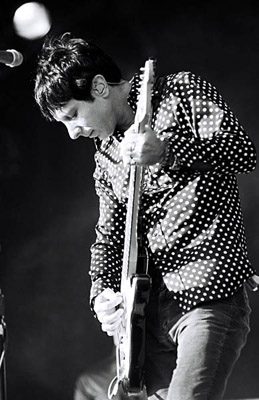
|
Goddess
On A Hiway
Well I got us on a hiway an' I got us in
a car
Got us goin' faster that we've ever gone
before
An' I know it ain't gonna last
An' I know it ain't gonna last
When I see yr eyes arrive
they explode like two bugs on glass
Far above th' ocean, deep under th' sea
There's a river runnin' dry because of
you an' me
She's a goddess on a hiway a goddess in a
car
A goddess goin' faster than she's ever
gone before
Mercury Rev
|
|
When I see yr eyes arrive...
Serpent with yr blue
planet eyes...
Got telephones for eyes...
With eyes like Abe
Lincoln...
What was th' reason for
th' color of yr eyes? |
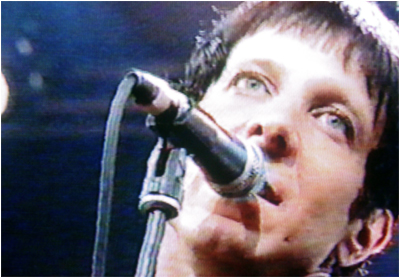 |
 |
Spiders
and Flies
Plans an' schemes
Thoughts an' dreams
Who cares what they mean...
When they work they're amazing things
When they don't I hear you scream
Spiders an' flies, live an' die
Six legs to stand on an' two wings to fly
I can't remember an' I can't decide
What was th' season an' th' color of yr
eyes
|
| Pharoahs an'
kings
Favourite queens
Buried with their
Precious rings
When they lived they loved complete
But in their tombs I hear them
scream
Spiders an' flies, live an' die
Six legs to stand on an' two wings to fly
It makes you wonder, why can't I
What was th' reason for th' color of yr
eyes |
Psalms and spells
Magic blast
Who cares what they cast
I dreamed I'd always love you complete
I never thought I'd hear you scream
Spiders an' flies, live an' die
Eight legs to stand on an' two wings to
fly
It makes you wonder, why can't I
What was th' reason for th' color of yr
eyes
Mercury Rev |
| random quotes... |
 |
|
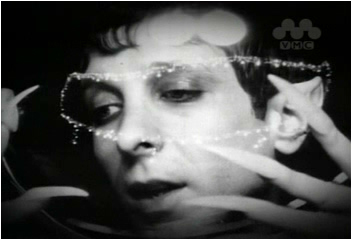
|
Other
songs/records/projects featuring Jonathan:
with The Flaming Lips:
In a Priest Driven Ambulance (1990)
Hit To Death In The Future Head
(1992)
Providing Needles For Your Balloons (1994)
This Here Giraffe (1996)
A Collection Of Songs...1984-1990
(1998)
The
Flaming Lips (avec Jathan comme guitariste) :wi
|
|
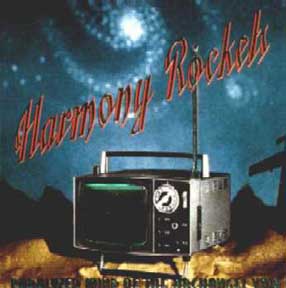
|
with Harmony
Rockets (Jonathan & Grasshopper):
Paralyzed Mind Of The Archangel Void
(1995)
I've Got A Golden Ticket (1997)
Collaboration:
A Camp, A Camp (2001)
The Chemical Brothers, Dig Your Own
Hole () - Jonathan appears on The Private Psychedelic Reel
The Chemical Brothers, Surrender (1999)
- Jonathan appears on Dream On (also co-written by him) |
| Below you can read an
interview with Jonathan. He talks about Mercury Rev's latest album, All
Is Dream (2001), and about some other things he cares about... (source:
Vinginmega.com)
Di seguito, potete leggere
un'intervista a Jonathan, in cui parla dell'ultimo album dei Mercury Rev, All
Is Dream (2001), e di altre cose che gli stanno a cuore... (fonte:
Virginmega.com) |
| Virginmega.com:
How do you feel about the new record, Jonathan? Critics are saying it's
your best.
Jonathan Donahue:
I feel really good. That's why it takes us such a long of time to make
them. We want to know that when it is done, we can sleep well at night
regardless of in the long run how well it goes. No matter what happens in
the charts or record sales or anything, we put everything we possibly have
into it.
Virginmega.com:
What was your biggest obstacle in making the album?
Jonathan: I was
trying to make sure that things flowed out of me and didn't really run
through too much of the selfish control aspect that can sometimes happen
with the human instinct rather than the human intuition. With a hammer and
chisel, sometimes when you do a sculpture it is better to just go and do
it without thinking. Sometimes if you brood over stuff too hard, you tend
to suck the life out of it, you know? Less is more. Just listen to the
songs and they'll tell you what they need. And that's what we do.
Virginmega.com:
It's a stunning record - spooky in a gorgeous sort of way. Do you
sense the eeriness in it yourself?
Jonathan: That's
just my mind. I'm not sure I'm a subjective person. It's the most accurate
representation I can say of most of my imagination, especially as far as
the lyrics. I sort of see it as me, not in a very egotistical way, but
just because that's what's going on in my mind at that point in time. So
if it's spooky, it's just me.
Virginmega.com:
I read that you take a lot of the lyrics from half remembered dreams.
Is that true?
Jonathan: A lot
of the symbolism and archetypes that float through my dreams inhabit a lot
of the lyrics. There are a lot of creatures in there that are metaphorical
more than anything. I try to make some sense of them and how they relate.
A lot of it is just intuitive. Often times you see an image before you and
it won't let you go. For me, I have to write it out, work it out and
manifest it in a physical way. Then the dream will let me go and move on
to something else. Otherwise it just keeps beating me over the head and I
don't get much sleep.
Virginmega.com:
In “The Dark is Rising,” when you sing about things being
concealed or revealed, was that written to a certain person or was it
metaphorical?
Jonathan: Both.
The meanings go a little bit bigger and encompass more of the idea in all.
There is a lot of levels to the meaning. Whether people care to search
them out, I leave to the listener. It's the mythology that we all live.
Joseph Campbell [popular mythologist author] was big into that - the
personal mythology. This is my mythology for that period of time,
lyrically. My heroes' journey, so to speak, for the time that I was
writing.
Virginmega.com:
Besides music, what else matters to you?
Jonathan: My
dogs, friendships with people that are at home … stuff that I heavily
love and rely on and often times treat quite poorly. These things are held
dear.
Virginmega.com:
You have dogs?
Jonathan: We've
got a farm [in the Catskill Mountains] and they run all around. They've
got snakes that live there and things like that. So, a lot of my day is
just spent living with animals.
Virginmega.com:
That helps explain the reoccurring images in lyrics like spiders,
snakes, the moon …
Jonathan: There
are a lot of snakes that inhabit my farm and most people are fearful, but
I just go out and talk with them for hours. I have a little lawn chair out
there where they all just bask in the sun and we talk and stuff like that,
so obviously they pop up in my dreams from time to time telling me things
to look out for. It's kind of a weird symbiotic relationship. It works for
me. Most people think it's crazy.
Virginmega.com:
What kinds of things do they warn you against? Are they accurate?
Jonathan:
Depending on how well I interpret them, they are always accurate, but
sometimes it takes awhile to tune in. There are a couple different
serpents. One is better at sort of being human in his translation. Some
are pretty symbolic and it takes me a while to figure out what they are
doing. If I talk to one whose name is Onyx, a 7-8 foot long black snake,
he's good. They're not poisonous, but they are really long and look like
cobras. Then there is the female one. She is deeper. I don't understand
her so well - it takes me a while to sort of get up to her wavelength. She
takes some time if I see her in a dream. A lot of times it's just very,
‘hey, look out for this.' She is very protective. She would be the one
to tell me if someone is on my ass, in a bad way. If someone is messing
with me in some way that is going to manifest itself, she'll give me the
heads up. Onyx is more about generalizations and sometimes he is more like
a trickster. He just sort of plays with me and f***s with me a little bit
more. They always sort of give you what you can understand, plus a little
bit more.
Virginmega.com:
A bit like Mercury Rev's music.
Jonathan: Yeah.
|
|
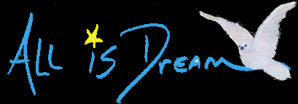
|
|